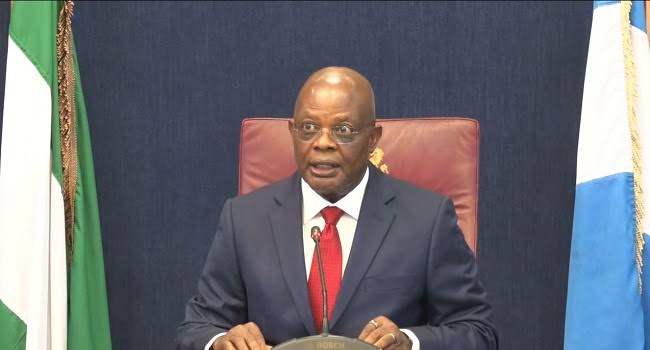Rivers State Sole Administrator, Vice Admiral Ibok-Ete Ibas (retd.), faced widespread condemnation on Wednesday after announcing the dismissal of all 23 local government caretakers and the chairman of the state electoral commission, despite a court order summoning him over the appointments.
In a statement issued by the Secretary to the State Government, Prof. Ibibia Worika, Ibas approved the appointment of new administrators for the LGAs and replaced Justice Adolphus Enebeli (retd.) as RSIEC chairman with Dr. Michael Odey. Four professors are among Odey’s six-member team. The appointments took effect on April 7, 2025.
The Federal High Court in Port Harcourt had earlier ordered Ibas to appear and explain why the court should not halt his plans to install administrators. The suit was filed by the PILEX Centre for Civic Education Initiative, led by Courage Msirimovu.
Governor Siminilayi Fubara’s Special Adviser on Electronic Media, Jerry Omatsogunwa, described the move as “impunity taken too far,” accusing Ibas of acting above the law. He emphasized that the National Assembly had already disapproved of Ibas’ attempt to prepare a state budget.
PANDEF National Chairman, Amb. Godknows Igali, accused Ibas of dismantling democratic institutions, including suspending statutory boards and removing the governor’s portrait from public offices. In an open letter, Igali stressed that Ibas’ mandate as an interim placeholder does not grant him sweeping powers.
Similarly, Rivers elder statesman Chief Anabs Sara-Igbe criticized Ibas’ legitimacy, calling his appointment unconstitutional and his actions tantamount to a political coup. He cited constitutional provisions allegedly violated by Ibas and the federal government.
The Rivers Emancipation Movement, led by Solomon Tamunotonye, condemned the appointments, alleging they were packed with loyalists of FCT Minister Nyesom Wike. The group threatened mass action, warning of deepening political tension in the state.
However, House Minority Leader and Obio/Akpor representative, Mr. Kingsley Chinda, defended the appointments, arguing that Ibas acted within the law. He said the LGAs had no elected chairmen when Ibas assumed office, and an interim administration was necessary until elections are held. Chinda maintained that Section 305 of the Constitution had not been breached.
Ibas’ reforms follow a Supreme Court ruling emphasizing democratic governance at the grassroots. In recent weeks, he suspended all heads of MDAs and cancelled pending procurement processes, citing the absence of an appropriation law.
As tensions rise, legal experts and civil society groups continue to scrutinize the constitutionality and democratic implications of Ibas’ controversial actions.








